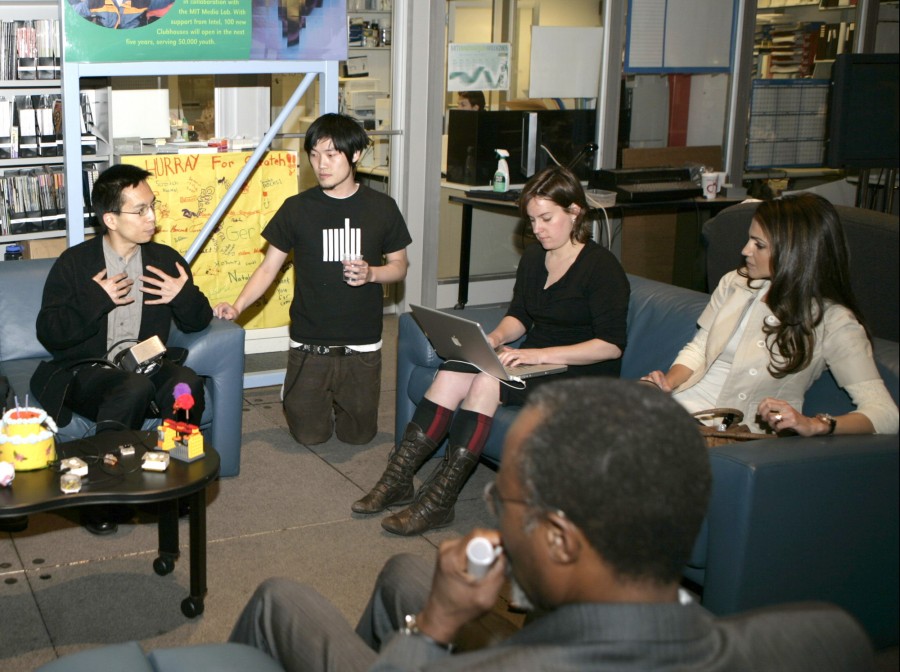Queen Rania Visits MIT, Briefed on Best Practices

(Office of Her Majesty, Press Department – Boston) During her last day in the city of Boston, Her Majesty Queen Rania Al Abdullah visited Massachusetts Institute of Technology (MIT), where the faculty briefed her on a number of successful initiatives launched there and touched on the upcoming MIT Learning International Networks Consortium (LINC). The initiatives are all in line with Queen Rania's core interests, including eradicating poverty, securing education for all, and empowering women.
During the visit, Her Majesty toured the Abdul Latif Jameel Poverty Action Lab (J-PAL), the Media Laboratory, and the Gehry Building, Stata center, and learned more about the MIT International Development Initiative (IDI) and One Laptop per Child Initiative. The labs are all examples of good practice of how MIT works with communities and partners around the world to make a difference. Her Majesty also met a number of Jordanian undergraduates and graduates currently attending MIT.
Queen Rania will soon be hosting MIT LINC in the Dead Sea, Jordan. It is an educational initiative sponsored by MIT, with the vision to provide quality education to all the world's children, regardless of geographic hindrances, by using today's computer and telecommunications technologies. This will be the fourth MIT LINC ever held.
The mission of MIT is to advance knowledge and educate students in science, technology, and other areas of scholarship that will best serve the nation and the world in the 21st century. Her Majesty saw this mission in practice as she toured the facilities.
A number of graduate students joined Rachel Glennerster, Executive Director of the J-PAL, and Professor of Economics Abhijit Banerjee to show the Queen around the lab. J-PAL serves as a focal point for development and poverty research based on randomized trials, they said.
The objective is to improve the effectiveness of poverty programs by providing policy makers with clear scientific results that help shape successful policies to combat poverty. J-PAL works with NGOs, international organizations, and others to evaluate programs and disseminate the results of high quality research. They work on issues as diverse as boosting girls' attendance at school, improving the output of farmers in sub-Saharan Africa, racial bias in employment in the US, and the role of women political leaders in India.
Her Majesty toured the Media Lab with John Maeda, Associate Director of Research at The Media Lab, and Professor Mitchel Resnick, LEGO Papert Professor of Learning Research. The lab's activities have helped to create now-familiar areas such as digital video and multimedia. The success of this agenda is leading to a growing focus on how electronic information overlaps with the everyday physical world.
Maeda also briefed Her Majesty on the One Laptop per Child (OLPC) Initiative, a new non-profit association dedicated to research to develop a $100 laptop. The technology could revolutionize how the world’s children are educated. This initiative was launched by faculty members at the MIT Media Lab, and was first announced by Lab co-founder Nicholas Negroponte, now chairman of OLPC, at the World Economic forum at Davos, Switzerland in January 2005.
Her Majesty also stopped in the Ray and Maria Stata Center, which contains the Computer Science and Artificial Intelligence Laboratory, the Laboratory for Information and Decision Systems, as well as the Department of Linguistics and Philosophy. Academic celebrities such as Noam Chomsky, Rodney Brooks, and Ron Rivest have offices there. W3C founder Tim Berners-Lee and Free software movement founder Richard Stallman also have offices there.
Also, directors and students, including Sally Susnowitz, Assistant Dean and Director of MIT Public Service Center; Alison Hynd, IDEAS Competition and Fellowships Coordinator; and Amy Smith, Instructor, Edgerton Center Co-founder of IDI, gave a presentation on the mission of IDI.
IDI was created to expand opportunities at MIT for work in international development, particularly for students. IDI is working to expand existing programs and to create new programs that will provide tangible assistance to developing regions and work towards defining community needs, finding appropriate design solutions, implementing and disseminating technologies, capacity-building and maintaining relationships with community partners. IDI runs the IDEAS competition, which encourages teams to develop and implement projects that make a positive change in the world. Entries are judged on their innovation, feasibility, and community impact.
MIT is recognized as one of the top educational institutions in the US. Teaching and research, with relevance to the practical world as a guiding principle, continue to be its primary purpose. Its five schools and one college encompass numerous academic departments, divisions, and degree-granting programs, as well as interdisciplinary centers, laboratories, and programs whose work cuts across traditional departmental boundaries.
Sixty-three current or former members of the MIT community have won the Nobel Prize
Featured
Queen Rania's official website
This website does not support old browsers. To view this website, Please upgrade your browser to IE 9 or greater
Your browser is out of date. It has known security flaws and may not display all features of this and other websites. Learn how to update your browser



